WASHINGTON D.C. -- The Gallup-Healthways Well-Being Index finds that only about one in four Americans (27%) are getting 30 minutes of exercise five or more days per week. Another 24% report exercising for at least 30 minutes on three or four of the last seven days, while nearly half (49%) report exercising for at least 30 minutes less than three days per week.
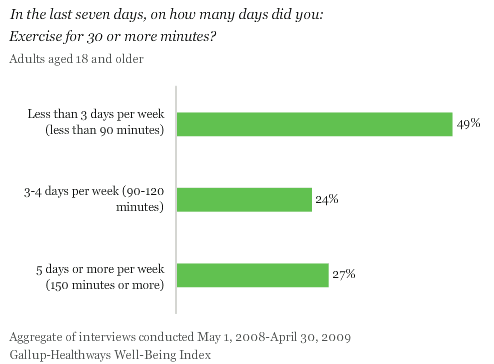
Gallup analyzed the results of more than 400,000 interviews, conducted from May 2008 to April 2009, during National Physical Fitness and Sports Month, observed every May since 1983. During the month of May the government works to promote the Department of Health and Human Services Physical Activity Guidelines. The guidelines state that in order to garner substantial health benefits, adults need a minimum of 30 minutes of moderate-intensity physical activity at least five days a week or at least 75 minutes of vigorous-intensity physical activity each week.
The DHHS Physical Activity Guidelines are the result of an extensive review of the scientific research on exercise and promote a level of physical activity proven to provide health benefits.
Amy Neftzger, Lead Researcher at Healthways, states that these health benefits are well-documented and include "a healthy weight, the slowing and prevention of the onset of diseases such as heart disease and type 2 diabetes, and helping to build bone strength."
Americans at a normal weight, according to Body Mass Index classifications, are more likely to report exercising 30 minutes five or more days per week than those who are overweight or obese. Of the respondents whose BMI falls within the normal weight range, 32% report exercising on five days or more in the last seven, compared to 28% of those who are overweight and 20% of those who are obese.
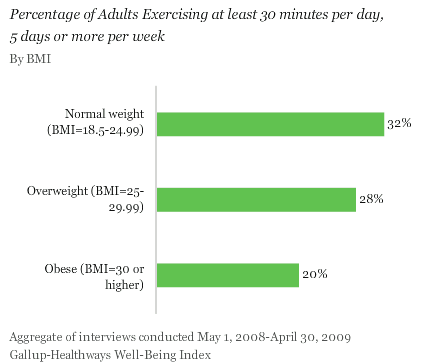
Aside from the differences in reported amount of exercise by BMI, there is little demographic variation. Older Americans are slightly more likely to say they are exercising at least 30 minutes at least five days per week than those who are younger. Men are also more likely than women, by a small margin, to report exercising on five or more days in a week.
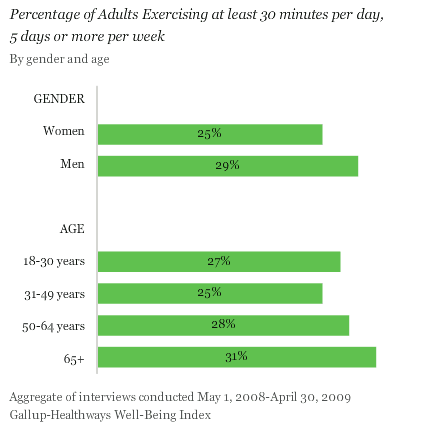
Emotional Benefits
In addition to the well-known physical health benefits of exercise, the Gallup-Healthways Well-Being Index reveals a compelling emotional benefit to frequent exercise. Those who exercise at least two days per week report experiencing more happiness and less stress than those who do not. Further, the benefits tend to increase slightly with more frequent exercise, save for those who exercise seven days per week.
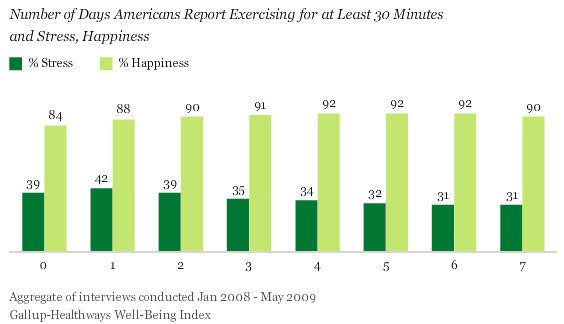
Exercising more frequently also appears to increase a person's likelihood to say they feel well-rested and have enough energy. Again, the Gallup-Healthways Well-Being Index reveals increasing benefits for each additional day of exercise, save for the seventh day, when benefits subside slightly. Both of these measures peak when a person reports getting 30 minutes of exercise six days per week.
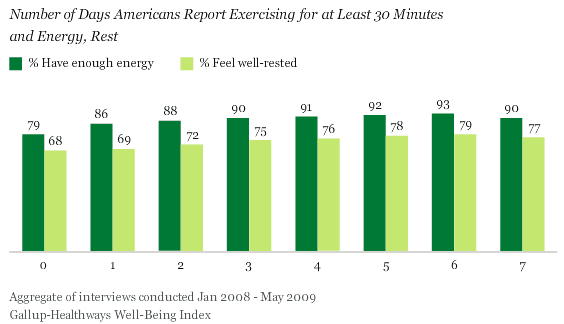
Given the documented benefits of frequent exercise for an individual's physical and emotional health, it is concerning to find that just under 50% of Americans report exercising less than three days a week. Neftzger notes that "the benefits of exercise are not in question and most individuals know that they should exercise, but what seems to be lacking is the motivation." Something that can assist motivation, she adds, is "finding a friend to exercise with you, which would also serve to boost social time, another proven key to higher wellbeing."
Survey Methods
Results are based on telephone interviews with over 400,000 adults in the United States, aged 18 and older, conducted January 2008 to April 2009 as part of Gallup Poll Daily tracking. For results based on the total sample of national adults, one can say with 95% confidence that the maximum margin of sampling error is ± 1 percentage point. In addition to sampling error, question wording and practical difficulties in conducting surveys can introduce error or bias into the findings of public opinion polls.
About the Gallup-Healthways Well-Being Index™
The Gallup-Healthways Well-Being Index™ measures the daily pulse of U.S. wellbeing and provides best-in-class solutions for a healthier world. To learn more, please visit well-beingindex.com.
